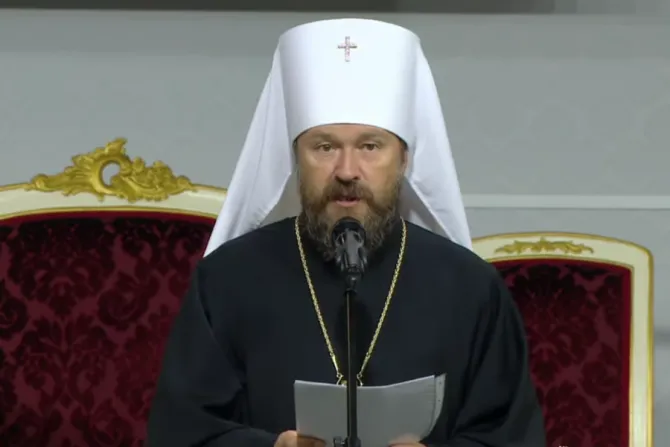Russian Orthodox Metropolitan Hilarion of Volokolamsk speaks at the International Eucharistic Congress in Budapest, Hungary, Sept. 6, 2021. | Screenshot from 52nd International Eucharistic Congress YouTube channel.
In response to a letter to the leader of the Russian Orthodox Church pleading for his intervention in the Ukraine conflict, Metropolitan Hilarion of Volokolamsk said his Church is praying for peace, and that it supports “direct negotiations” between Russia and Ukraine.
The president of the European bishops’ commission, Cardinal Jean-Claude Hollerich of Luxembourg, had on March 8 appealed to Russian Orthodox Patriarch Kirill to intervene for peace in the conflict with Ukraine.
Hollerich asked Kirill to “address an urgent appeal to Russian authorities to immediately stop the hostilities against the Ukrainian people and to show goodwill for seeking a diplomatic solution to the conflict, based on dialogue, common sense, and respect for international law while allowing safe humanitarian corridors and unrestricted access to humanitarian assistance.”
Patriarch Kirill is the leader of the Russian Orthodox Church, an autocephalous Eastern Orthodox Church with an estimated 150 million members, accounting for more than half of the world’s Eastern Orthodox Christians. He is thought to be close to Russian president Vladimir Putin.
Metropolitan Hilarion of Volokolamsk, chair of external Church relations for the Russian Orthodox, responded to Hollerich’s letter by writing, “It is completely obvious that the current conflict cannot be resolved through yet another public statement [sic], already made in large numbers.”
While noting that he and other Russian Orthodox leaders have called for “fervent prayers” for peace, Hilarion seemed to exclude the possibility of an appeal for peace from the Russian Orthodox Church to Russian authorities.
“The most important thing in this situation is to do everything in our power to make sure that the direct negotiations continue, producing a result in the shortest possible time, and that the relationships between the West and Russia still have a potential for dialogue,” Hilarion wrote.
Hilarion wrote that he believes the Bishops’ Conferences of the European Union (COMECE) could assist in that dialogue by “working with representatives of the European Union in order to prevent further escalation of the current situation and to help overcome it on the basis of the Christian values which unite us all.”
That portion of the letter comes amid the backdrop of a lengthy statement issued March 24 by NATO Heads of State and Government, condemning the invasion “in the strongest possible terms” and warning that thousands of defence troops are being amassed.
Hilarion also urged support for refugees and “all those affected by the hostilities.”
Catholic bishops across Europe have urged Patriarch Kirill to seek an end to Russia’s war with Ukraine. They include the Irish bishops, Poland’s Archbishop Stanisław Gądecki, and Germany’s Cardinal Reinhard Marx.
Pope Francis discussed the Ukraine war with Patriarch Kirill during a video conference call on March 16. The Vatican Press Office reported that the two leaders agreed on the importance of current negotiations to end the war.
Pope Francis has sought to strengthen Catholic-Eastern Orthodox ties since his election in 2013. He has formed a close bond with Ecumenical Patriarch Bartholomew I of Constantinople. But the Russian Orthodox Church severed ties with the Ecumenical Patriarchate of Constantinople in 2018 after Bartholomew confirmed that he intended to recognize the independence of the Orthodox Church of Ukraine.
In early March, a Swiss university suspended Hilarion from his post as a professor for failing to condemn the invasion.
Source: CNA

